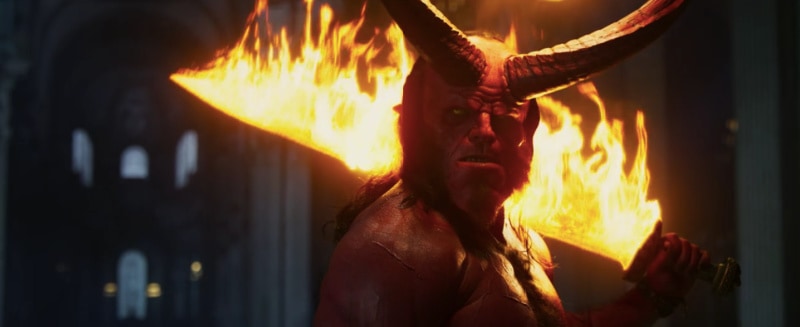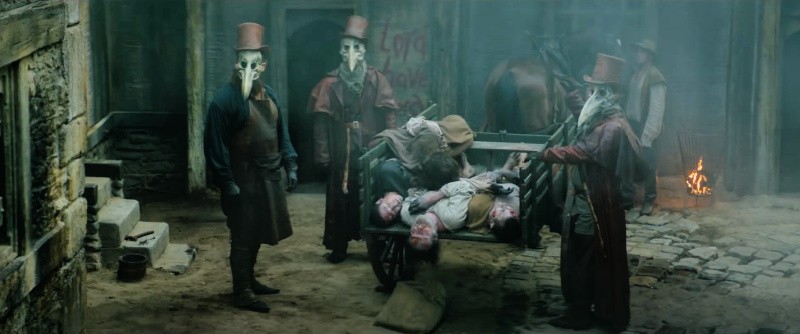Check the Gate is a reoccurring column where we go one-on-one with directors in an effort to uncover the reasoning behind their creative decisions. Why that subject? Why that shot? In this edition, we chat with Neil Marshall and discuss how he escaped a miserable filmmaking experience by throwing himself into The Reckoning.
Creation is a monster. You start with an idea. It’s a nice idea. You grow to love that idea. Then, you get to work on that idea, and outside factors get to work on it too. Suddenly, the idea doesn’t seem as bright as it once did. The idea remains only that, and the work you did to achieve it results in something totally unrecognizable. The failure leaves you feeling miserable.
F that noise. Screw that old idea. Find a new one and get back on the job.
The Reckoning is Neil Marshall shaking off the wretched time he had on Hellboy. When he began that project, his brain was brimming with joy and veracity. The tinkering from other parties mutated the final product into something unbearable—a movie that was his, but also not his. Exhausted from the experience, Marshall needed to throw himself back into the horror genre. He required less money with fewer eyes on it. Freedom thrives in the gnarly B-movie realm.
Marshall felt denied by Hellboy. He imagined that film as a horror bonanza, but his partners didn’t see it that way. So, when it came to The Reckoning, he was god damn determined to craft a truly nasty tale of terror. The Reckoning is a very human horror that relishes in cruelty. Set toward the tail end of the 17th Century in Northern England, the story follows a widow’s resolve against a fear-mongering populace. Witches are seen everywhere, and the devil provides an easy excuse for men to strengthen their domination.
The Reckoning offered Marshall a chance to revisit the vibe that established his career. He’s a DIY filmmaker, making his bones on tightly-wound and inventive monster mashes. Dog Soldiers and The Descent are two flicks that pushed their budgets to their limits and made their limits their selling points. The director knew he could get back to that place with The Reckoning.
“I’d come out of a particularly miserable experience doing Hellboy,” says Marshall. “On that film, there was no creative control whatsoever. I knew I wanted to get back and do a really good horror film. Get back into the horror world and do something where I might not have all the bells and whistles and the big-budget or whatever, but I’d regain creative control over the work I was doing. Something more akin to the films I was making at the start of my career.”
Marshall has difficulty hearing anything positive about his previous film. The film is a heavy metal eruption for this writer, celebrating the weird and wonderful creatures born from comic book creator Mike Mignola’s pen. For Marshall, it’s an aborted endeavor, but one that taught him some hard lessons about himself.
“I think it could’ve been something interesting,” he says. “The reason that I was invited to do it in the first place was because they said they wanted to make the horror version of Hellboy, and I guess that was the base that lured me in. And then, of course, I was never allowed to do that, so, I don’t know, it was one of those things.”

There is a lot of sting behind Marshall’s conversation regarding Hellboy. You can hear it throbbing behind every word. There’s a tinge of fatigue as well, but mostly pain. He doesn’t like thinking about it. He wants to concentrate on his new film and what’s lies ahead.
“The main thing I learned from that experience,” Marshall continues, “is it helped me decide what I wanted to do next. To focus on my own projects, on my own scripts. Hellboy was the first thing that I’d done that I hadn’t written. Working on my own stuff again meant making a low-budget movie. That was a small sacrifice to make for having creative control. The experience making The Reckoning, however difficult it was, was way more deeply satisfying than anything that Hellboy had to offer.”
Once The Reckoning crossed Marshall’s desk, the film moved rapidly. The inspiration to get horrific and put something new out there in the world was lit. The dominos fell into place, and they fell sweetly until a mighty big wall blocked their progress.
“A friend approached me with this idea of a witch hunt movie,” he explains. “Myself and Charlotte [Kirk] embraced it and decided to co-write it. We just really dug in. Then it kind of went from there. It was a very quick turnaround because we wrote it together in 2018, and shot it in 2019, and finished it at the beginning of 2020. It’s just taken a little bit of time, obviously due to COVID, to be released.”

It’s clear watching Marshall’s films that he adores a great many genres. His flicks happily dip in and out of multiple cinematic flavors. A chunky rocky road will always satisfy his palette versus plain vanilla or strawberry. Toss it all in, and let’s get messy.
“Once I started realizing that I had people with big hats, horses, and pistols,” says Marshall, “I saw this as an opportunity to do a British Western. At least for the first act of the story. That appealed to me. And, yeah, certainly it comes from the traditions of gothic English horror—both from the literary side, but also Hammer Horror and Witchfinder General, and all those kinds of things. There’s a big appeal to that world, and I don’t think you see it in my previous films.”
Marshall wears many hats on The Reckoning. He co-wrote the script, he directed it, and he cut it together. But, within that process, there are numerous ways the film could fall apart or drift away from the original intention. Despite his Hellboy trials, Marshall also understands that you can’t be too precious with the initial germ. Change must occur.
“The movie is an evolution,” he says. “There’s the film that you saw in your head when you were writing it, and there’s the film that actually comes out. And as much as they are akin, they are essentially two versions of the same thing. The film is bound to a certain set or a certain location, and also a certain weather on a certain day.”
The burning question becomes, did The Reckoning deliver on the idea that started Marshall on his journey? Did he walk away satiated from his terrible time on Hellboy? Before he answers, the director takes a long breath and leaves a pause lingering in the air.
“Yes and no,” he says. “On a creative level, yes. But I’m going to have to keep on making movies. That’s the only way you’ll achieve [satisfaction]. Just keep on making movies.”
The Reckoning starts streaming on Shudder on May 13th.
0 comments:
Post a Comment